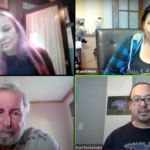JHR project to tackle gender equality in international media
When women and girls succeed, their families succeed.
So said Journalists for Human Rights chair Michael Cooke and Minister for Women and Gender Equality Maryam Monsef at the launch of a $11.7 million JHR project funded by Global Affairs Canada.
Announced on World Press Freedom Day, the NGO’s latest project will involve expanding its international training programming in an effort to better include women in local conversations about human rights issues and increase their presence and representation in media.
Canada World: Voice for Women and Girls will bring media expertise from Canadian partners, including APTN, La Presse, the National Post, Bell Media/CTV News and Corus/Global TV to build capacity for more equitable and fulsome coverage in countries like Kenya, the Democratic Republic of Congo, Jordan and Turkey.
Today we’re launching “Canada World: Voice for Women & Girls” with Minister @MaryamMonsef announcing $11.7 mill from @CanadaDev to advance press freedom & the rights of women & girls in the Middle East, DRCongo & Kenya – JHR’s biggest program to date! #WorldPressFreedomDay pic.twitter.com/5gB41PxuXe
— Journalists for Human Rights (JHR) (@jhrnews) May 3, 2019
Men outnumber women five to one in these environments, JHR’s executive director Rachel Pulfer told J-Source, and that workplace imbalance has serious implications for what stories get told.
“So-called women’s issues – health, education, environment and child welfare – are too often put to the side in favour of hyper-partisan political coverage that further destabilizes these fragile environments,” she said at an announcement at Corus’s Toronto headquarters on Friday.
“JHR has found through 12 years of practice that prioritizing women’s voices and concerns and coverage and working with powerful media leaders…to champion women’s leadership in newsrooms delivers issues-driven overage that communities engage with towards discussions of positive change.”
The project will involve embedding Canadian media trainers in newsrooms to engage men and women in JHR’s cultural and gender sensitivity training and leadership, entrepreneurship and human resources programming.
Bringing skills and leadership development training to these newsrooms will help to ensure that 50 per cent of the world’s population can have their voices and concerns heard, said Pulfer.
“That’s balance and fairness,” she said.
The program will bring JHR’s training framework to its three primary goals, outlined in a press release:
-
Strengthening local media sectors through journalism training to improve local coverage of human rights, with an emphasis on women’s and girls’ rights;
-
Ensuring greater public input into decision-making, in particular on the rights of women and girls; and
-
Improving the participation of women and girls in public life through media and civil society.
Canadian media partners will also have the opportunity to do on-the-ground storytelling, an increasingly rare opportunity to do original international journalism and development reporting, an opportunity Global Affairs was keen on, Pulfer told J-Source.
For JHR, which helps to advance press freedom education internationally with training programs in these regions already, being identified as Canadian has been an advantage, said Pulfer.
“I noticed that whenever we would go to one of these environments, when people realize that we were Canadian, the tension went out of the room,” she said, citing JHR’s reception in South Sudan, where the organization was able to help advance understanding of regional press laws.
“I have been amazed at how much we have been able to accomplish in these environments given just being identified as Canadian and therefore as partners, rather than as shapers.”
Canada World: Voice for Women and Girls, which is funded for four years, is expected to serve more than 1,000 journalists, 640 journalism students, 650 key stakeholders and “engage over 600,000 citizens in the targeted regions,” according to the JHR press release.
Media trainers will also work with local universities to help build curricula.
Steph Wechsler is J-Source's managing editor.


